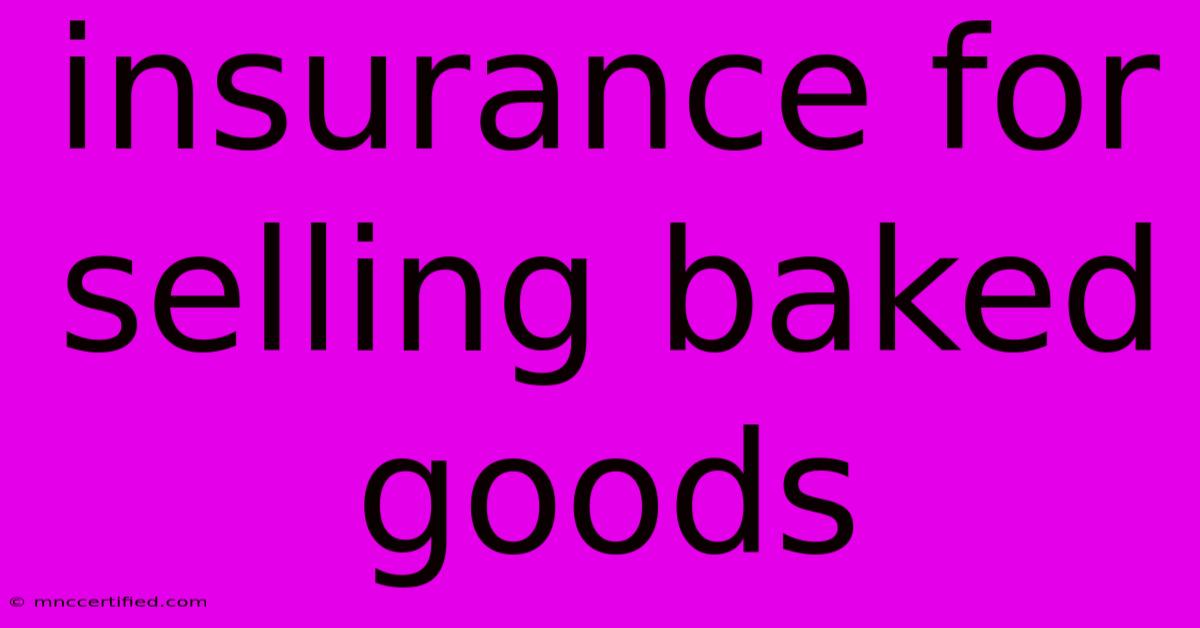Insurance For Selling Baked Goods

Table of Contents
Insurance for Selling Baked Goods: A Baker's Guide to Legal and Safe Operations
Selling baked goods, whether from a home kitchen or a bustling storefront, is a delicious dream for many. However, before you start frosting those cupcakes, it's crucial to understand the insurance landscape for food businesses. This guide will help you navigate the essential policies to protect your business and your customers.
Why You Need Insurance for Your Baking Business
Selling food carries inherent risks. A single incident, such as food poisoning or a customer injury on your premises, could lead to significant legal and financial repercussions. Insurance provides a critical safety net, protecting you from devastating losses. Ignoring this crucial aspect could jeopardize your entire venture.
Key Risks Covered by Insurance:
- Foodborne Illness: This is a major concern. Liability insurance will cover claims arising from customers becoming ill after consuming your baked goods. This includes medical expenses, legal fees, and potential settlements.
- Property Damage: If your home kitchen or commercial space is damaged by fire, flood, or other unforeseen events, insurance can help with repairs or replacement.
- Product Liability: This covers claims related to faulty products – for example, if a customer finds a foreign object in your baked goods.
- General Liability: This broader coverage protects against accidents or injuries that occur on your premises (if applicable), such as a customer slipping and falling.
- Professional Liability (Errors and Omissions): While less common for bakers, this can be valuable if a customer alleges a mistake in a custom order, such as a cake not meeting their specifications.
Types of Insurance for Bakers: A Closer Look
Understanding the specific types of insurance is key to securing adequate protection.
1. General Liability Insurance:
This is often the most essential policy for any food business. It covers bodily injury or property damage caused by your business operations. This is crucial if you're operating from a commercial space or have customers visiting your premises.
2. Product Liability Insurance:
This specifically addresses claims arising from injuries or illnesses caused by your baked goods. It’s critical for any business selling food products.
3. Commercial Property Insurance:
If you operate from a commercial space, this protects your building, equipment, and inventory from damage or loss due to fire, theft, or other covered events. This is less crucial for home-based businesses, where homeowners insurance might offer some coverage.
4. Workers' Compensation Insurance:
If you employ others, this is a legal requirement in most areas. It covers medical expenses and lost wages for employees injured on the job.
Choosing the Right Insurance for Your Baking Business
The right insurance policy depends on several factors:
- Scale of Operations: A home-based business with limited sales will have different needs than a large bakery with many employees.
- Sales Volume: Higher sales volume often necessitates higher coverage limits.
- Location: Insurance costs and coverage requirements can vary by location.
- Type of Products: Specialized products might require additional considerations.
Finding an Insurance Provider:
Start by researching insurance providers that specialize in food businesses or small businesses. Get multiple quotes to compare coverage and pricing. Don't hesitate to ask questions – understanding your policy is paramount.
Beyond Insurance: Protecting Your Baking Business
Insurance is a crucial component, but it's not the only step towards protecting your business. Consider these additional measures:
- Food Safety Certifications: Demonstrating your commitment to food safety through certifications like ServSafe can build customer trust and potentially reduce your risk.
- Proper Food Handling Practices: Following strict hygiene and food safety protocols is essential to prevent foodborne illnesses.
- Clear Contracts (for custom orders): Detailed contracts can mitigate disputes with customers over custom orders.
Conclusion:
Selling baked goods can be incredibly rewarding, but protecting your business from potential risks is non-negotiable. By understanding the different types of insurance available and taking proactive steps to ensure food safety, you can build a thriving and secure baking business. Don't delay – secure the necessary insurance coverage today.

Thank you for visiting our website wich cover about Insurance For Selling Baked Goods. We hope the information provided has been useful to you. Feel free to contact us if you have any questions or need further assistance. See you next time and dont miss to bookmark.
Featured Posts
-
Seahawks Vs 49ers 2024 Livestream
Nov 18, 2024
-
I M A Celebrity 2024 How Long It Lasts
Nov 18, 2024
-
Player Ratings England Vs Ireland Match
Nov 18, 2024
-
Itv I M A Celeb Faces Viewer Complaints
Nov 18, 2024
-
I M A Celeb Jones Hidden Talent
Nov 18, 2024